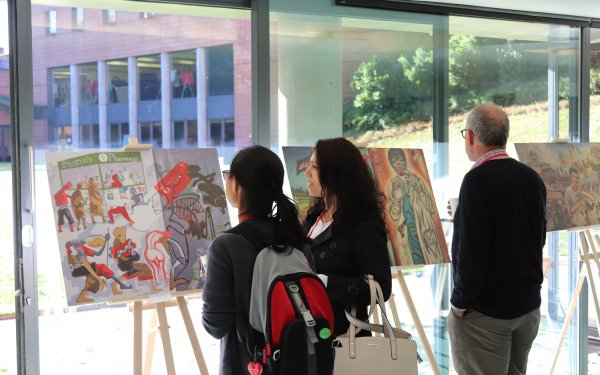PHARMACIDE ARTS - Fake medicine: the disease of greed
If you’re in Oxford, UK between now and January 4th, 2019 visit the Radcliffe Science Library at the University of Oxford to see a new art exhibition of 14 prints illustrating the global health impact of poor quality medicines.

The proliferation of poor quality medicines is an important but neglected public health problem, threatening millions of people all over the world, both in developing and wealthy countries. Much attention is focused on improving access to affordable medicines, but more is need to ensure that the medicines and medical products we buy are good quality or not altogether falsified. It is estimated that 1 in 10 medicines are substandard, falsified or unregulated (World Health Organization), and as many as 30% of antimalarials in Southeast Asia, affecting the lives and livelihoods of millions of people, especially those living in low and middle income countries.
“All over the world, medicines regulatory authorities, academic research groups, international organisations, law enforcement agencies and other key stakeholders, including the pharmaceutical industry, are working hard to keep patients safe and to try to ensure that the benefits of modern medicine are delivered. Despite these efforts, there is a need for greater awareness, coordination, regulation and funding to tackle the persistent problem of poor quality medicines. We have a global health challenge that needs to be addressed with much greater urgency at every level of the system,” says Professor Paul Newton, Head of the Medicine Quality Group at the Infectious Diseases Data Observatory (IDDO) and Director of the Oxford Clinical Research Unit in Laos.
The original artworks were created by several artists from Southeast Asia, the print exhibition was recently presented at the first ever ‘Medicine Quality and Public Health’ international conference, organised by the Infectious Diseases Data Observatory, the Centre for Tropical Medicine & Global Health, the Mahidol-Oxford Research Unit at the University of Oxford and the Global Public Health Program of the United States Pharmacopeia.
Visit the exhibition until Friday, 4 January 2019.
he Radcliffe Science Library is open to all University of Oxford staff on Parks Road, Oxford OX1 3QP.
Find out more about the university’s work on Medicine Quality.
Interested in Medicine Quality? Follow us on Twitter @IDDOnews. Email info@iddo.org
